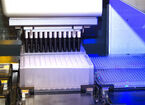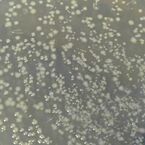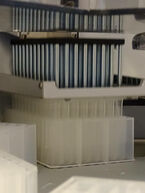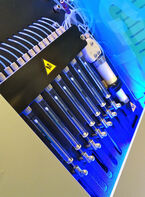U-READ: Unit for Rapid Engineered Antibody Development
Isolation of antibodies
The continuous demand from basic and applied research is increasing the need for isolating antibodies with desired properties in more efficient manners. Recombinant antibody technologies combined with in vitro display methods, such as phage display, offers a great alternative to traditional immunization techniques. Not only does it provide a renewable monoclonal source of antibodies, the process generates characterized antibody fragments in approximately three to four weeks compared to months with immunizations. Phage display technology allows control over the selection processes to a higher degree than what is possible with immunizations. Also, since the system allows the DNA encoding the antibody fragments to be easily manipulated, fine-tuning of affinity and specificity can easily be done. In addition, since all the steps of the selection and screening process are liquid based they can be automated.
High-throughput phage selection
At the department we have set-up a high-throughput phage selection and screening pipeline that allows us to generate binders to a large number of antigens in a short time frame. This pipeline was originally scaled-up as part of AFFINOMICS, an EC FP7 Collaborative Project.
The Unit is able to select specific antibodies from large in-house developed antibody libraries using phage display technology. As proof of principle, generated antibodies are used in-house in a variety of research applications, for instance in our various affinity proteomics platforms.
Analysis
The U-READ platform has access to analytical instrumentation of great value in studies of molecular interactions and molecular cell binding properties. We host a Biacore X1+ instrument for assessment of interaction kinetics using surface plasmon resonance technology. We also host a flow cytometry instrument (iQue Plus) for studies of cells and cell binding properties at high throughput. We are also closely connected to the Department of Immunotechnology's regular flow cytometry unit that hosts a multi-color spectral flow cytometer and cell sorter.
National engagement
The unit is integrated as a Display and Selection Technologies Unit into SciLifeLab's Drug Discovery and Development platform. This National Facility supports the development of therapeutic antibodies to targets as suggested by the partner primary investigators.
International engagement
The U-READ platform is engaged within the international Adaptive Immune Repertoire Community's effort to generate resources for and advocate for better practice in and understanding of immunoglobulin and T cell receptor gene annotation and analysis, to promote high research of repertoires och cells and molecules that make up adaptive immunity. In this efforts we collaborate directly with one of the nomenclature sub-committees within the International Union of Immunological Societies.
Contact
If you need more information on such efforts or are interested in using U-READ for your research efforts, please contact Mats Ohlin.






Technical platforms
The unit uses its in-house developed antibody fragment (scFv) library for selection of specific antibodies using phage display technology. We host a variety of technology platforms such as:
- Hamilton robot for efficient liquid handling
- King Fisher robot for efficient, parallell phage display selection procedures a variety of immunoassay platforms including ELISA, Luminex etc.
- Biacore 1X+ surface plasmon resonance-based real time high through-put interaction assessment platform
- iQue Plus high content, high throughput flow cytometry assay platform for analysis of protein binding to cells and particles.
The Department also hosts a variety of other technology platforms including flow cytometry (analyzer as well as spectral cell sorter), qPCT, GeoMx Digital Spatial Profiler, nanostring nCounter analysis system, et cetera.
References
Examples of studies that have engaged U-READ resources
- Izadi A, Godzwon M, Söderlund Strand A, Schmidt T, Kumlien Georén S, Drosten C, Ohlin M, Nordenfelt P (2024) Protective non-neutralizing anti-N-terminal domain mAb maintains Fc-mediated function against SARS-COV-2 variants up to BA.2.86-JN.1 with superfluous in vivo protection against JN.1 due to attenuated virulence. J Immunol (in press) (Abstract)
- Thalén NB, Karlander M, Lundqvist M, Persson H, Hofström C, Turunen SP, Godzwon M, Volk AL, Malm M, Ohlin M, Rockberg J (2024) Mammalian cell display with automated oligo design and library assembly allows for rapid residue level conformational epitope mapping. Commun Biol 7, 805. (Abstract)
- Izadi A, Karami Y, Bratanis E, Wrighton S, Khakzad H, Nyblom M, Olofsson B, Happonen L, Tang D, Sundwall M, Godzwon M, Chao Y, Toledo AG, Schmidt T, Ohlin M, Nilges M, Malmström J, Bahnan W, Shannon O, Malmström L, Nordenfelt P (2024) The hinge-engineered IgG1-IgG3 hybrid subclass IgGh47 potently enhances Fc-mediated function of anti-streptococcal and SARS-CoV-2 antibodies. Nat Commun 15, 3600. (Abstract)
- Collins AM, Ohlin M, Corcoran M, Heather JM, Ralph D, Law M, Martínez-Barnetche J, Ye J, Richardson E, Gibson WS, Rodriguez OL, Peres A, Yaari G, Watson CT, Lees WD (2024) AIRR-C IG Reference Sets: curated sets of immunoglobulin heavy and light chain germline genes. Front Immunol 14, 1330153. (Abstract)
- Mortensen ACL, Berglund H, Segerström L, Walle M, Hofström C, Persson H, Nygren PÅ, Nilvebrant J, Frejd FY, Nestor M (2023) Selection, characterization and in vivo evaluation of novel CD44v6-targeting antibodies for targeted molecular radiotherapy. Sci Rep 13, 20648. (Abstract)
- Hueting D, Schriever K, Sun R, Vlachiotis S, Zuo F, Du L, Persson H, Hofström C, Ohlin M, Walldén K, Buggert M, Hammarström L, Marcotte H, Pan-Hammarström Q, Andréll J, Syrén PO (2023) Design, structure and plasma binding of ancestral β-CoV scaffold antigens. Nat Commun 14, 6527. (Abstract)
- Peres A, Lees WD, Rodriguez OL, Lee NY, Polak P, Hope R, Kedmi M, Collins AM, Ohlin M, Kleinstein SH, Watson CT, Yaari G (2023) IGHV allele similarity clustering improves genotype inference from adaptive immune receptor repertoire sequencing data. Nucleic Acids Res 51, e86. (Abstract)
- Lees WD, Christley S, Peres A, Kos JT, Corrie B, Ralph D, Breden F, Cowell LG, Yaari G, Corcoran M, Karlsson Hedestam GB, Ohlin M, Collins AM, Watson CT, Busse CE; AIRR Community (2023) AIRR community curation and standardised representation for immunoglobulin and T cell receptor germline sets. Immunoinformatics 10, 100025. (Abstract)
- Mattsson J, Ljungars A, Carlsson A, Svensson C, Nilsson B, Ohlin M, Frendéus B (2023) Sequence enrichment profiles enable target-agnostic antibody generation for a broad range of antigens. Cell Rep Methods 3, 100475. (Abstact)
- Izadi A, Hailu A, Godzwon M, Wrighton S, Olofsson B, Schmidt T, Söderlund-Strand A, Elder E, Appelberg S, Valsjö M, Larsson O, Wendel-Hansen V, Ohlin M, Bahnan W, Nordenfelt P (2023) Subclass-switched anti-spike IgG3 oligoclonal cocktails strongly enhance Fc-mediated opsonization. Proc Natl Acad Sci USA 120, e2217590120. (Abstract)
- Jackson KJL, Kos JT, Lees W, Gibson WS, Smith ML, Peres A, Yaari G, Corcoran M, Busse CE, Ohlin M, Watson CT, Collins AM (2022) A BALB/c IGHV Reference Set, Defined by Haplotype Analysis of Long-Read VDJ-C Sequences From F1 (BALB/c x C57BL/6) Mice. Front Immunol 13, 888555. (Abstract)
- Babrak L, Marquez S, Busse CE, Lees WD, Miho E, Ohlin M, Rosenfeld AM, Stervbo U, Watson CT, Schramm CA (2022) AIRR Community. Adaptive Immune Receptor Repertoire (AIRR) Community Guide to TR and IG Gene Annotation. Methods Mol Biol 2453, 279-296. (Abstract)
- Bahnan W, Wrighton S, Sundwall M, Bläckberg A, Larsson O, Höglund U, Khakzad H, Godzwon M, Walle M, Elder E, Strand AS, Happonen L, André O, Ahnlide JK, Hellmark T, Wendel-Hansen V, Wallin RP, Malmstöm J, Malmström L, Ohlin M, Rasmussen M, Nordenfelt P (2022) Spike-Dependent Opsonization Indicates Both Dose-Dependent Inhibition of Phagocytosis and That Non-Neutralizing Antibodies Can Confer Protection to SARS-CoV-2. Front Immunol 12, 808932. (Abstract)
- Söderlund Z, Ibáñez-Fonseca A, Hajizadeh S, Rodríguez-Cabello JC, Liu J, Ye L, Tykesson E, Elowsson L, Westergren-Thorsson G (2022) Controlled release of growth factors using synthetic glycosaminoglycans in a modular macroporous scaffold for tissue regeneration. Commun Biol 5, 1349. (Abstract)
- Collins AM, Peres A, Corcoran MM, Watson CT, Yaari G, Lees WD, Ohlin M (2021) Commentary on Population matched (pm) germline allelic variants of immunoglobulin (IG) loci: relevance in infectious diseases and vaccination studies in human populations. Genes Immun 22, 335-338. (Abstract)
- Willén D, Mastio R, Söderlund Z, Manner S, Westergren-Thorsson G, Tykesson E, Ellervik U (2021) Azide-Functionalized Naphthoxyloside as a Tool for Glycosaminoglycan Investigations. Bioconjug Chem 32, 2507-2515. (Abstract)
- Smakaj E, Babrak L, Ohlin M, Shugay M, Briney B, Tosoni D, Galli C, Grobelsek V, D'Angelo I, Olson B, Reddy S, Greiff V, Trück J, Marquez S, Lees W, Miho E (2020) Benchmarking immunoinformatic tools for the analysis of antibody repertoire sequences. Bioinformatics 36, 1731-1739. (Abstract)
- Lees W, Busse CE, Corcoran M, Ohlin M, Scheepers C, Matsen FA, Yaari G, Watson CT; AIRR Community; Collins A, Shepherd AJ (2020) OGRDB: a reference database of inferred immune receptor genes. Nucleic Acids Res 48, D964-D970. (Abstract)
- Ljungars A, Svensson C, Carlsson A, Birgersson E, Tornberg U-C, Frendéus B, Ohlin M, Mattsson M (2019) Deep mining of complex antibody phage pools generated by cell panning enables discovery of rare antibodies binding new targets and epitopes. Front Pharmacol 10, 847 (Abstract)
- Ohlin M, Scheepers C, Corcoran M, Lees WD, Busse CE, Bagnara D, Thörnqvist L, Bürckert JP, Jackson KJL, Ralph D, Schramm CA, Marthandan N, Breden F, Scott J, Matsen Iv FA, Greiff V, Yaari G, Kleinstein SH, Christley S, Sherkow JS, Kossida S, Lefranc MP, van Zelm MC, Watson CT, Collins AM. Inferred Allelic Variants of Immunoglobulin Receptor Genes: A System for Their Evaluation, Documentation, and Naming. Front Immunol. 2019 Mar 18;10:435. (Abstract)
- Ljungars A, Mårtensson L, Mattsson J, Kovacek M, Sundberg A, Tornberg UC, Jansson B, Persson N, Kuci Emruli V, Ek S, Jerkeman M, Hansson M, Juliusson G, Ohlin M, Frendéus B, Teige I, Mattsson M (2018) Phenotypic discovery of therapeutic antibodies and targets for cancer treatment. NPJ Precis Oncol 2, 18. (Abstract)
- Persson H, Kirik U, Thörnqvist L, Greiff L, Levander F, Ohlin M (2018) In vitro evolution of antibodies inspired by in vivo evolution. Front Immunol 9, 1391. (Abstract)
- Säll A, Walle M, Wingren C, Müller S, Nyman T, Vala A, Ohlin M, Borrebaeck CAK, Persson H (2016) Generation and analyses of human synthetic antibody libraries and their application for protein microarrays. Prot Eng Des Select 29, 427-437. (Abstract)
- Säll A, Persson H, Ohlin M, Borrebaeck CAK, Wingren C (2015) Advancing the Global Proteome Survey platform by using an oriented single chain antibody fragment immobilization approach. New Biotechnol 33, 503-513. (Abstract)
- Säll A, Sjöholm K, Waldemarson S, Happonen L, Karlsson C, Persson H, Malmström J (2015) Development of phage-based antibody fragment reagents for affinity enrichment of bacterial IgG binding proteins. J Proteome Res 14,4704-4713. (Abstract)
- Gerdtsson AS, Malats N, Säll A, Real FX, Porta M, Skoog P, Persson H, Wingren C, Borrebaeck CAK (2015) A multicenter trial defining a serum protein signature associated with pancreatic ductal adenocarcinoma. Int J Proteomics 2015, 587250. (Abstract)
- Säll A, Carlsson F, Olsson N, Wingren C, Ohlin M, Persson H, Waldemarson S (2014) AFFIRM – a multiplexed immunoaffinity platform that combines recombinant antibody fragments and LC-SRM analysis. J Proteome Res 13, 5837-5847. (Abstract)
- Taussig MJ, Stoevesandt O, Borrebaeck CAK, Bradbury AR, Cahill D, Cambillau C, de Daruvar A, Dübel S, Eichler J, Frank R, Gibson TJ, Gloriam D, Gold L, Herberg FW, Hermjakob H, Hoheisel JD, Joos TO, Kallioniemi O, Koegll M, Konthur Z, Korn B, Kremmer E, Krobitsch S, Landegren U, van der Maarel S, McCafferty J, Muyldermans S, Nygren PÅ, Palcy S, Plückthun A, Polic B, Przybylski M, Saviranta P, Sawyer A, Sherman DJ, Skerra A, Templin M, Ueffing M, Uhlén M (2007) ProteomeBinders: planning a European resource of affinity reagents for analysis of the human proteome. Nat Methods 4, 13-17. (Abstract)
